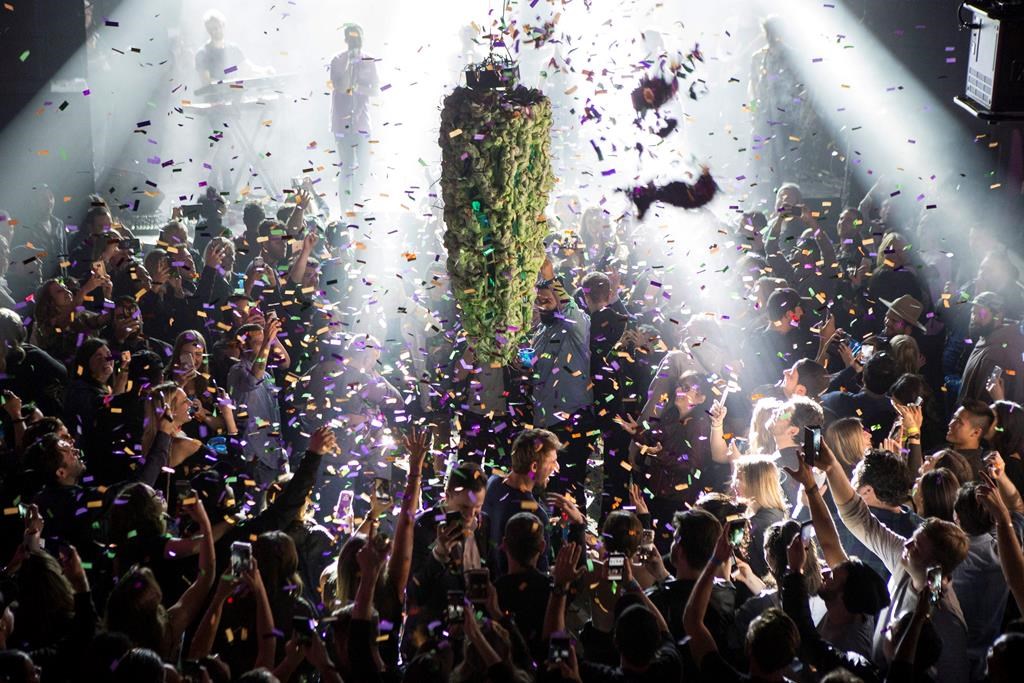For many Canadians, legalization has been a bit anti-climactic.

Excited folks who stayed up to legally buy weed online in the wee hours of Oct. 17th, were either hitting reload in the hopes that crashed sites would start working again, or waiting around for their credit cards to process.
And some of those who didn’t wait up late to seize their chance just after midnight found supplies had dwindled.
One Saskatoon-based retailer, Living Skies Cannabis, said it’s ready to open — but can’t get its hands on enough marijuana supply. “There simply really isn’t a lot of supply,” said the owner of the company, Cierra Sieben-Chuback. “It’s all sort of spoken for across the entire country.”
Global News talked to a retailer in Moose Jaw who couldn’t open due to a lack of supply, and another in Yorkton who quickly ran out on legalization day.

In Winnipeg, private retailer Delta 9 was sold out online by 4 a.m. on Oct. 17, but had a little bit of dried flower back in stock by late Friday. By 4 p.m. on Wednesday, more than half of the strains of cannabis flower (56 out of 98 listed) on the publicly-run B.C. website were listed as sold out.
There are two main problems. The first is that legal production capacity has yet to scale up to meet demand, which itself has several causes, the federal government’s slow pace in approving growers among them. There have also been weird glitches. The Financial Post reported federal excise stamps, required to be affixed to cannabis to show that taxes were paid, were shipped without glue, which delayed shipments.
The other problem is that in some provinces, warehouses seem behind in the exercise of getting product off a shelf and onto a truck. While Premier Doug Ford told the Ontario legislature Wednesday morning that the OCS site had received over 38,000 orders overnight, a spokesperson wouldn’t disclose how many had actually been shipped.
And a final barrier that would be a bummer for those who managed to order and are waiting on packages: a possible Canada Post strike is interfering with delivery plans.

In brief:

Get daily National news
- • We looked into how much weed costs across the country. And if you’re still confused about the regulations in your province or territory, here’s a guide to clarify things.
- • Hours after legalization, the Royal Newfoundland Constabulary laid what might have been the country’s first charge under the brand-new Cannabis Act.
- • Until a bricks-and-mortar store network gets completed, Canadians will meet most of their cannabis needs online. Eight provinces opened government-operated cannabis sites at midnight on Wednesday, and we checked them all out.
- • Can grey-market dispensaries in Indigenous communities operate outside the law? We report from the Tyendinaga First Nation in Ontario, where dispensaries are flourishing.
- • U.S. border officials confirmed Canadians could be banned from entering the U.S. if it came to light that they’ve smoked pot legally in Canada.
- • Not everyone is happy with legalization: Conservative leader Andrew Scheer said his party was “going to propose changes” if it took power, but would not commit to bringing back prohibition.

You asked:
Why is the government holding back legalization of edible THC products until next year? Smoking marijuana has been linked to chronic respiratory problems and it’s also more difficult to control dosage as opposed to edibles. Why not legalize all marijuana products at the same time, including high-quality edibles?
Edibles — cannabis-infused food products like peanut butter, candy, and the classic brownie — got blamed for overconsumption in some U.S. states like Colorado. People either made the classic mistake of not waiting to feel its effects, which can take as long as two hours, and ate more, or just misunderstood the intended dose.
The other issue is that children have been known to eat carelessly stored edibles. There have been a handful of recent cases in Canada — a two-year-old on Vancouver Island and a four-year-old in Nova Scotia were hospitalized this year after eating candy-form edibles.
For better or worse, Canadian governments seem to have taken the approach that it’s easier to start off with strict rules and relax them than to start off with loose rules and make them stricter. Rules for food-form edibles are promised by October of 2019. Gel caps containing cannabis oil are being sold, and while they’re not as fun to ingest as the high-end chocolate edibles sold in California, they do have the same effect. But if brownies are your thing, while you can’t buy them, you can still make your own.

A reader writes
- Wow, times have sure changed. For us older generation people born in the ’40s and 50s, who grew up in a time when using marijuana was considered a crime on the same level as rape and murder, it’s incredible to read a headline with the words “What should the THC limits be for cops?” In 1968, I had an 18 year-old friend who got a year in Oakalla Maximum Penitentiary for selling a $5 gram of hash to an undercover narc. Another guy I knew got a year and a half in Oakalla for selling two ounces of pot. Neither of these young guys had any previous criminal records! Yet they were thrown in with the worst criminals in general population. Now today we’re debating about how much pot police officers should be allowed to smoke before going on duty!







Comments
Want to discuss? Please read our Commenting Policy first.